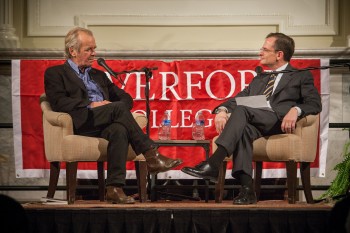Martin Amis Comes to Haverford

President Dan Weiss (right) conducted a public conversation with Martin Amis about his work.
Details
Martin Amis' literary appeal to readers of all ages was evident March 5, when students, faculty, and staff came to Founders Great Hall to hear him talk about his work, as well as politics past and present.
The British author, who lives in Brooklyn with his wife and two daughters, is the author of 14 novels, seven works of non-fiction, and several collections of stories. He received the James Tait Black Memorial Prize, Britain's oldest literary award, for his memoir Experience.
Amis started the evening at Haverford with a rumination on dictators, comparing Adolf Hitler and Joseph Stalin, or“the little mustache and the big mustache,” as he referred to them. Amis has revisited World War II and the Holocaust in his writing over the course of his career. Time's Arrow: Or the Nature of the Offence, published in 1991, details the life of a German doctor at Auschwitz in a reverse chronology. Amis' latest novel, The Zone of Interest, scheduled to be released in the fall, is set in a concentration camp.
After the talk, a discussion followed between the author and Haverford College President Daniel H. Weiss. The two became friends several years ago after Amis spoke at Lafayette College, where Weiss was president at the time. Weiss, who called Amis“one of the most accomplished writers alive and a remarkably interesting person,” observed that, aside from his Holocaust-centered novels, the majority of Amis' work tends to explore the absurd side of life.
“It's a simple matter of being attracted to extremes,” said Amis. “The middle road does not appeal to me.”
Fiction is a“spooky art,” Amis said. Writing fiction is really“playing catch up with your subconscious.” He explained that when confronted with a creative block, he stops writing and does something else. Meanwhile, his subconscious gets to work on solving the writing problem.
Weiss called Amis a master of the English language and the creator of unforgettable characters, noting Amis has been compared to Charles Dickens.
Amis said his often“hideous” characters are fun to read about, and are like looking at a tiger in a zoo as opposed to seeing one in the street right in front of you. Monstrous characters can't hurt you, he said. “The real challenge is writing about good people.”
Asked what advice he would give Haverford students, Amis cautioned against getting caught up in ideology and political correctness, or the constriction that comes with each. “You should not have a dependent mind. You should not need consensus or safety in numbers,” he said.
Later, Amis questioned whether difficult decisions can be made in the United States because of the fragile state of democracy. “The egotism of governments” means elected officials try to avoid taking unpopular actions because they're always thinking about the next election, he said.
Amis said“several strains of complete insanity” currently exist in the United States, with the prevalence of guns being one of them. “There should be a humanitarian intervention in the U.S.,” he said.
At the close of the event, fans lined up to have Amis sign copies of his novels, from his 1973 debut, The Rachel Papers, to the 2012 satire, Lionel Asbo: State of England. As she waited in line, anthropology major Gillian Miswardi '16 showed off her first edition copy of Amis' London Fields. Chris Bobbe '17 brought a copy of Money that the author signed 20 years ago for Bobbe's father, who mailed him the book so he could get a second signature from Amis.
The talk is available as video, with a listening guide.
—Samantha Drake



